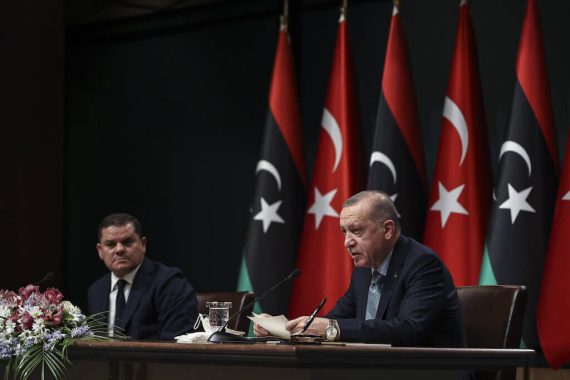The Libyan capital Tripoli was shaken by a wave of clashes between rival armed groups during the early hours of May 17. The clashes were instigated by the sneaking into Tripoli of Fathi Bashagha, who was designated as the prime minister by the Tobruk-based parliament, the House of Representatives (HoR), in February this year on the grounds that the incumbent Government of National Unity (GNU) in Tripoli had expired its mandate since elections did not occur on December 24, 2021.
The fact that a “designated prime minister” had to sneak into the capital of the country is itself telling enough. Bashagha had to keep his entry into Tripoli, in the middle of the night, highly secret. He revealed his arrival on social media, bragging about his ultimate “successful entry,” as this was his third attempt to enter Tripoli. The previous two unsuccessful attempts were both foiled by the tenacity of the armed groups who either remained loyal to the incumbent prime minister Abdel Hamid Dbeibah or were unconvinced by Bashagha’s claim to be prime minister.
In his first attempted entry into Tripoli, Bashagha was expelled after a heated “negotiation” between armed groups barely avoiding an armed conflict. His eventual entry on May 17 resulted in anti-Bashagha forces attacking the Nawasi Brigade, which had escorted Bashagha into Tripoli and hosted him in its headquarters. Eventually, it had to give in to the heavy pressure from the anti-Bashagha forces and handed him over to a neutral military force to escort him out of the city on the same day.
Bashagha’s attempts to enter Tripoli and the subsequent clashes among armed groups are symptoms of a wider political and regional power struggle. Formalities aside, Bashagha’s claim to premiership became possible only after his coalition with the HoR and more importantly, its speaker Aguila Saleh. The Saleh-Bashagha coalition aims at dismantling the Dbeibah-led GNU and replacing it with the Bashagha-led Government of National Stability (GNS), which would be heavily under the influence of the “kingmaker” of the coalition—Khalifa Haftar.
The Regional and International Aspect of the Saleh-Bashagha Coalition
Although the initiative started as Saleh and Bashagha’s pursuing their personal interests, the coalition was not built in a vacuum. The Saleh-Bashagha coalition lobbied in certain capitals for their alliance, and made their move once they received the green lights and blessing of those same capitals. Although the coalition promised to be useful to many, each capital committed to it to varying degrees.
While some capitals endorsed the coalition openly, others demonstrated their support more indirectly. Paris and other European capitals as well as Riyadh were among the lower-profile supporters of the Saleh-Bashagha coalition. However, Cairo and Moscow were much more straightforward in their endorsement.
Among all external backers of the Saleh-Bashagha coalition, Cairo merits the most attention as it was arguably the chief architect of the parallel government move. Furthermore, Cairo’s move complicated Ankara’s calculations and position in Libya, as the move threatened the stability in Tripolitania where Turkey’s interests are currently concentrated. This gains another meaning within the context of the ongoing efforts toward rapprochement between Egypt and Turkey.
Turkish-Egyptian Rapprochement over Libya?
Libya could have been the engine of Turkish-Egyptian rapprochement, or a theatre of convergence over which Ankara and Cairo would find a workable balance through mutual trade-offs. In fact, there were signs of this throughout 2021 when Cairo resumed the inroads into Tripoli it had started before the advent of the GNU. Dbeibah seemed to have no problem with cultivating relations with Cairo along with other formerly “hostile” capitals.
Moreover, Dbeibah’s mixed credentials, namely his “old regime” background coupled with his cordial relations with the “revolutionaries” made him a tailor-made figure of consensus between Ankara and Cairo, since “old regime” vs. “revolutionaries” were roughly the very fault lines driving a wedge between Ankara and Cairo for the past decade.
Recommended
While Dbeibah did not hide Turkey’s special place among Tripoli’s friends, he did not leave Egypt out, either. On the contrary, Dbeibah granted more contracts to Cairo than he did to Ankara to placate the former and ensure its neutrality vis-à-vis Tripoli. As a matter of fact, Ankara was not bothered by losing some Tripoli stakes to Cairo as it thought that they would work as the proverbial carrot for the latter. Nevertheless, Cairo chose to proceed with a zero-sum mentality: winning was not good enough for Cairo, it wanted to make sure that Ankara was not winning as well.
An agreement over Dbeibah would mean a rapprochement slightly more favorable to Ankara than Cairo. Cairo, on the other hand, wanted to keep the rapprochement with Ankara on its own terms. Thus, Cairo came up with a rival premiership proposal with purportedly “pro-Turkey” Bashagha, which would also supposedly appease Ankara. However, this was the greatest smokescreen in the whole parallel government scheme: Cairo consented to the Saleh-Bashagha coalition only after making sure that Bashagha was transformed into something else—the junior partner of the greater coalition of Haftar and Saleh.
Bashagha’s role was envisioned as nothing more than being a subordinate to the Haftar-Saleh duo. His function was supposed to be to extend the influence over Tripoli of both Haftar and Saleh, and their external backers, none more so than Cairo. Therefore, Cairo saw in the Saleh-Bashagha coalition the prospect of undermining Ankara’s prevalence in Tripoli and duly supported it.
The idea of negotiating with Ankara after diluting its position of strength in Tripoli through a change of government appeared much more attractive than engaging in a win-win setting with Ankara. Unless Cairo comes to terms with Ankara’s presence and influence in Tripoli, Libya will not be a theatre of convergence between the two countries.





